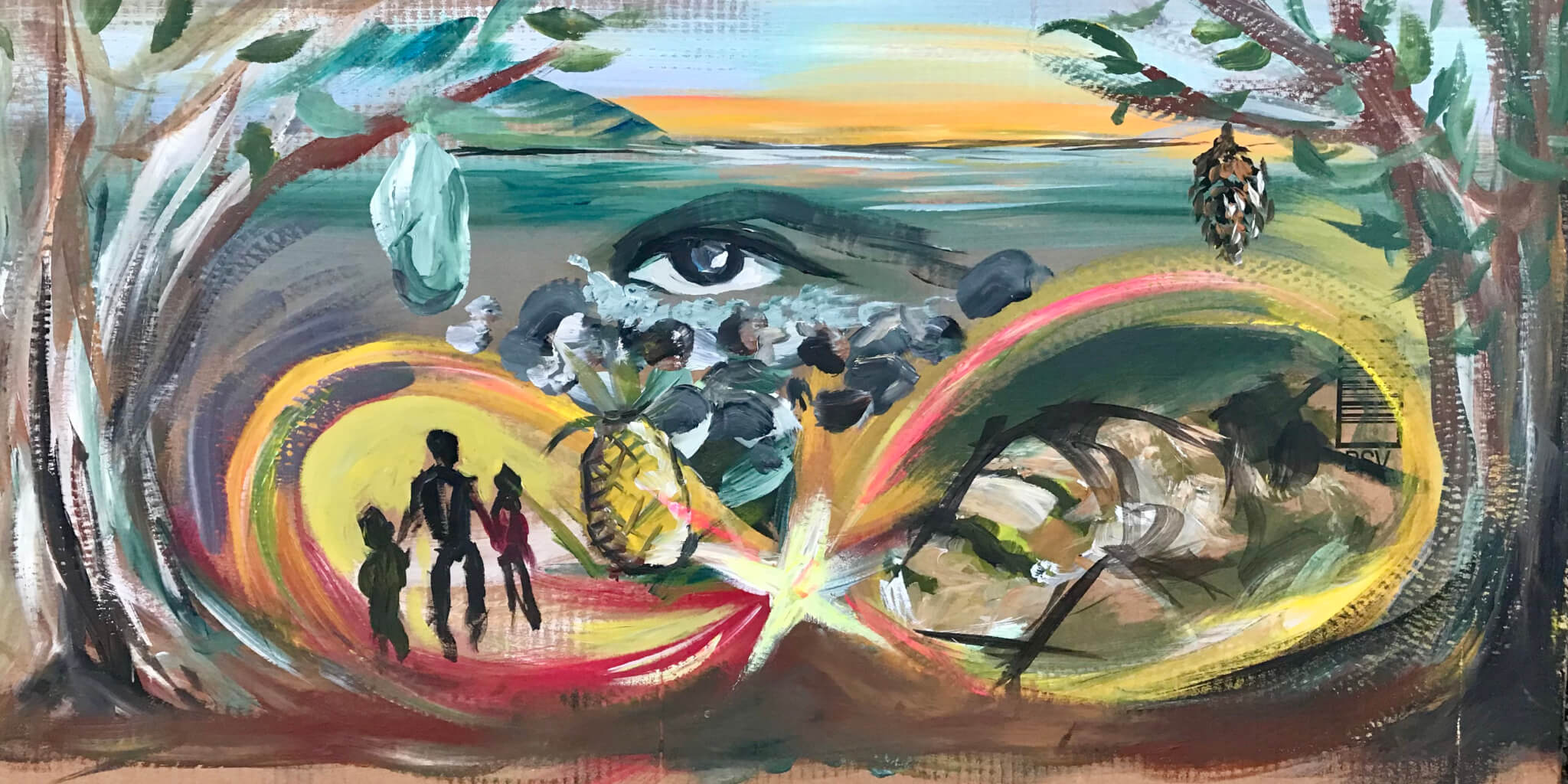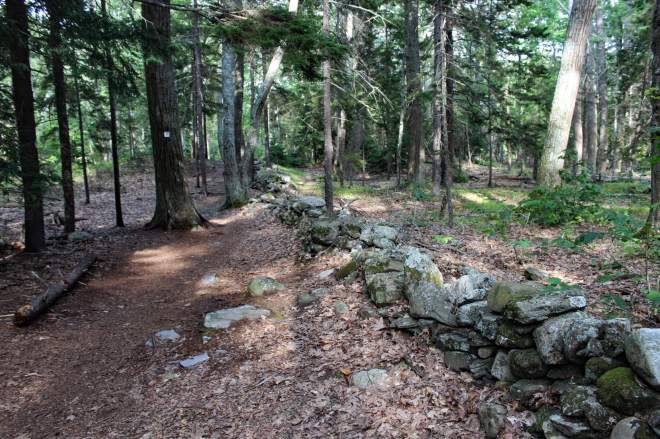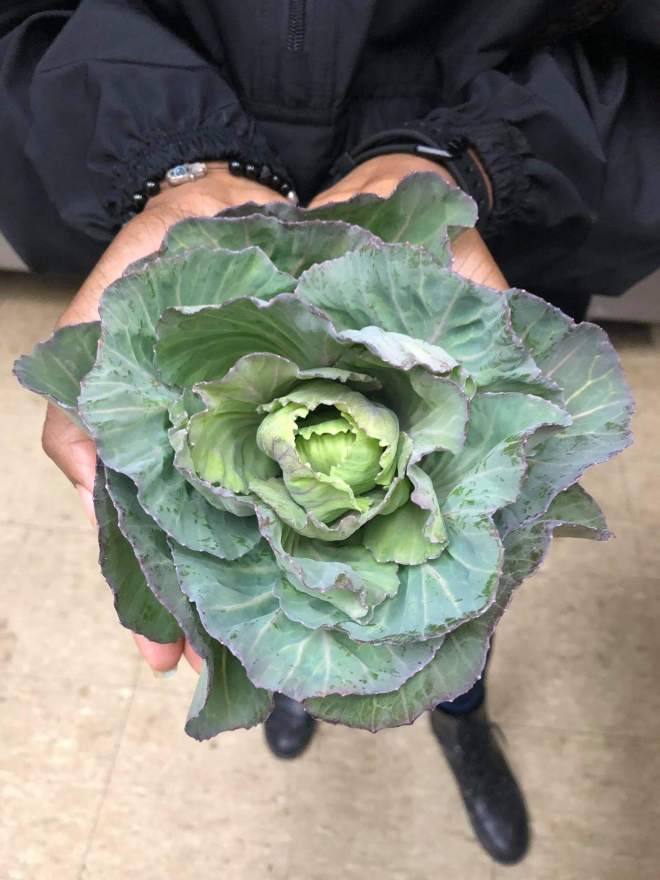New class of Global Ministries EarthKeepers expands purpose

Traditionally, EarthKeepers participating in an in-person training would bring an object that represents an experience of God in the natural world. It would then be used to decorate their worship space for the training. For the online event, participants shared their objects and stories online, while artist Joann Lee Kim used the stories and objects to create this painting that was used as a focal image during the training.
By Michelle Okabayashi
December 9, 2020 | ATLANTA
Global Ministries commissioned 24 new EarthKeepers from 14 United Methodist annual conferences through an online service on Dec. 8, 2020.
EarthKeepers is a training program of Global Ministries and the United Methodist Committee on Relief. It is designed to equip United Methodist clergy and laity to lead their communities in environmental stewardship. All Global Ministries’ EarthKeepers are expected to launch an environmental project in their communities as part of their work.
The EarthKeepers program is one part of a larger focus on issues of Environmental Sustainability for Global Ministries. “We cannot talk about mission without taking action to deal with the impact of climate change,” noted Roland Fernandes, general secretary of Global Ministries and UMCOR. “Global Ministries’ Theology of Mission statement – which is the basis for all our work – reminds us that ‘God’s light shines in every corner of the earth and God’s mission extends to all creation.’ Taking good care of creation is essential to mission. We are increasing our focus on the work of Environmental Sustainability, including the development of strategies that address the root causes of this crisis.”
In previous years, EarthKeepers have gathered for a 3.5-day in-person training prior to their online commissioning. For the safety of all involved, this year’s gathering was held online. It included 8.5 hours of live training over two weeks and 35-hours of asynchronous learning. The Rev. Jenny Phillips, who directs the Global Ministries EarthKeepers program, noted that extending the training into two weeks allowed more time for reflection and “created the opportunity for several people to participate who have wanted to attend in the past but could not travel to an in-person training.”
Cost, travel and time away all required more resources than were available to Kim Wendt, one of the EarthKeepers commissioned on Tuesday. “When I first heard about the program, I was dismayed to learn that it was in-person only,” she said. “When the 2020 EarthKeepers class went virtual, I was emailing Rev. Jenny to get in before registration went live.” Wendt is not alone; several of this year’s EarthKeepers were able to be a part of the training because it did not require travel.
Environmental stewardship and social justice
A hallmark of the EarthKeepers program is the marriage of social justice and environmental stewardship. “People tend to see environmental concerns as separate from social justice,” comments Wendt, who is working to create a network of churches in Florida to host electric vehicle charging stations as a way to serve their communities. “EarthKeepers really encourages thoughtful consideration around the social justice aspects of environmental concerns,” she explained. One of the primary tenets of EarthKeepers projects is that they consider the impact on both the environment and the community, asking questions like: Does this project/program impact the community in a racially just, morally fair and socially equitable way?
In early 2020, Phillips worked with the Rev. Dana Neuhauser from New City Church in Minnesota to rework the antiracism components of the EarthKeepers curriculum, making them more actionable for participants when they returned to their communities. These changes in the EarthKeepers training helped participants to not only look at how to better care for the earth, but how to better care for other people in the process.

PHOTO: COURTESY STEVE HILL
“What I took away from it was the intersectionality around climate injustice, racial injustice, economic inequity. . . and I think that helps us be more intentional about that as we’re teaching within our congregation and beyond,” said the Rev. Priscilla Dreyman of Cape Elizabeth United Methodist Church in Maine. Dreyman, Steve Hill, Rev. Bob Webster and Linda Webster are working together to use the forested area on their church property to create a place for connection with God’s creation, providing space for meditation, healing and retreats.
While the project was well developed prior to attending the EarthKeepers training, the four attended to connect with other likeminded individuals and learn more about how to implement their program. What they gained was so much more: “I think we have an opportunity . . . to help the Cape Elizabeth community wake up to their white privilege and how they have some power that they can use to help with the racial injustice, economic injustice and climate injustice going on,” said Linda Webster.
Keeping the community at the center
This class of EarthKeepers is also working to meet needs that are deepening in the midst of the COVID-19 pandemic. The Rev. Audrey Rodgers is the director of the Tuskegee University Wesley Foundation in Alabama. Tuskegee University, a historically Black university and a home for agricultural training, sits in one of the largest food deserts in the country. In her role, Rodgers works with students in a variety of capacities – including addressing food insecurity on campus and in the community – a crisis that has only increased in 2020.
“Being in campus ministry and in a pandemic, you can be siloed and isolated,” noted Rodgers. Through the EarthKeepers program, she found “a community to have conversations about projects, the earth and how to be stewards of it.”
Starting with a student-led program to develop a community garden, Rodgers and students worked to find creative solutions to increase food security on campus. However, even with the 500 pounds of fruits and vegetables that the garden produced, the students could use little of what was grown because they had no access to stoves, or they didn’t know how to prepare the food. The majority of the food produced was given to a local food bank, which Rodgers said “was a drop in the bucket in the food insecurity” for the area. Seeing a better way to meet needs, they adjusted the kinds of crops they grow in the garden and developed a food pantry to better supply students’ needs.

PHOTO: WESLEY FELLOWSHIP, TUSKEGEE UNIVERSITY
“EarthKeepers did change my approach to start with students and to end with them as well. To make sure they remain central and the focus. To make sure we give voice to those who are not necessarily privileged and include them in the conversation from beginning to end,” said Rodgers of her takeaway from the EarthKeepers program.
To ensure these conversations happen, Rodgers, along with a student and fellow EarthKeeper, Amber Nunn, has developed a community asset assessment tool called C.A.K.E. (connectivity, assets, knowledge, ecosystem). Each component helps evaluate the assets of a local community. “The C.A.K.E assessment tool is designed to help EarthKeepers foster dialogue with a broad spectrum of the community, listen deeply and work in tandem to co-create projects that are just and sustainable,” explained Rodgers. This tool, still in development, will help keep the community at the center of future programs.
For more information or to support the EarthKeepers program, visit umcmission.org/earthkeepers.
Michelle Okabayashi is a freelance writer and editor for Global Ministries.
2020 EarthKeepers
Alabama-West Florida
Amber Nunn
Rev. Audrey Rodgers
Arkansas
Rev. Angie Gage
Baltimore-Washington
Alan Ward
Rev. Rebecca Vardiman
Florida
Sara Nussel
Kim Wendt
Illinois
Tricia Smith
Minnesota
Jon Urban
New England
Rev. Priscilla Dreyman
Steve Hill
Michael Leonard
Linda Webster
Rev. Robert Webster
North Georgia
Rev. Bomi Kim
Rev. Millie Kim
North Carolina
Linda Hevner
Dianne Gagnon
Oklahoma
Rev. Paul McDowell
Pacific Northwest
Elizabeth Williams
South Georgia
Pat Homer
Susquehanna
Rev. Lenore Hosier
Rebecca Hosier
Wisconsin
Mary Volmer

